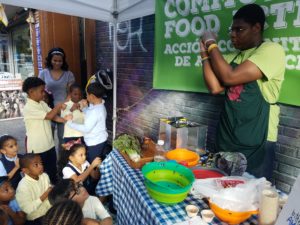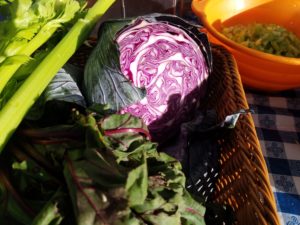By Maria Caicedo, Cooking and Gardening Coordinator
I believe that teaching kids through food is not only valuable but indispensable. Farmers Markets for Kids workshops create a space for conversation about, and interaction with, healthy foods; out in the open, on the street, where people are free to join in, share, and learn together. We know because every time we hold a veggie up to show our children and they don’t know what it is, there’s a child who is slowly losing that innate connection he or she, and all of us, have with nature. We’ve seen it so many times. Any kind of green leaf becomes “salad” but what is its name? How does it grow? How long does it take to come from the farm to the table? Who harvests it? These are all valid and important questions for kids to wonder about. Food comes from the earth, from plants. Before we were bombarded with processed foods, all we ate were plants and meat from the animals we hunted.
At FMK, we find room to address these topics, and kids have so much insight. Some know more than we sometimes expect. And at other times we are perplexed by how much they don’t know. This is why every time we introduce a veggie to a child and they love it, we’re over the moon.
A couple of weeks ago, we showed our children different kinds of potatoes and emphasized there are so many more kinds than we could possibly bring to the market. At the sight of a purple one, one kid yelled “it’s a purtato!”. We must expose children to the many varieties of veggies and fruits that exist so they understand the earth is rich and diverse, just like its people. Most recently we cooked a recipe with cabbage and children couldn’t wrap their heads around the look of it when we crosscut it open. To help them visualize a cabbage from the inside, we asked the children to put their hands together palms down over one another in an overlapping fashion and then asked groups of kids to do it together so they could see their many hands were like the cabbage layers that came together to form it. Every time children have an experiential learning moment of this kind, they understand better and they develop almost an instant renewed appreciation for that which they’re learning about. Hands come together to make a cabbage, to support, to cook, to make change.
When we first began the FMK season this year, it seemed really long before we would close shop and “call it a day” but time really does fly and we’re coming near the end, when we hide for the winter months. And we will miss our cabbage hands, our “purtato” heads.

